Your Airline Passenger Rights & When You’re Entitled to Compensation
Amaro Law Firm > Attorney Legal Articles > Your Airline Passenger Rights & When You’re Entitled to Compensation
January 13, 2023
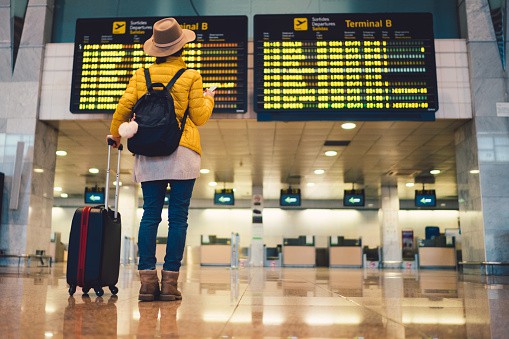
Many Air Travelers Don’t Know Their Rights Under Federal Law. Do You?
Air travel comes with certain fly rights for passengers. In fact, as chaotic as airports and flying can be these days, you DO have certain airline passenger rights under federal law, and airlines are legally required to honor your rights and abide by the law. Unfortunately, however, many major airlines are falling short of their responsibilities — and their customers have noticed and taken action. That’s likely one reason why airline passenger complaints have skyrocketed nearly 270% since 2019. Notably, close to one in three of these complaints has involved a delayed or canceled flight. Despite those reports — along with growing media attention and recent airline debacles, like the Southwest holiday meltdown of 2022 — more than 8 in 10 air travelers don’t know their airline passenger rights. To help you get more familiar with them, this guide shares:- An Overview of Your Airline Passenger Rights
- Why & How Your Airline Passenger Rights Could Change Soon
- When Air Travelers Are Due Compensation
- How Much Compensation You May Be Entitled to Recover
- How to Assert Your Air Passenger Rights
- Important Resources, Forms & More for Air Travelers
An Overview of Your Airline Passenger Rights
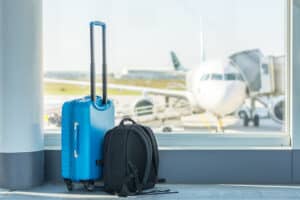 In the U.S., your Fly Rights as an airline passenger are governed by federal law and regulations overseen by the U.S. Department of Transportation (DOT). Extensive and highly detailed, your Fly Rights cover several aspects of the air travel experience, including (but not limited to):
In the U.S., your Fly Rights as an airline passenger are governed by federal law and regulations overseen by the U.S. Department of Transportation (DOT). Extensive and highly detailed, your Fly Rights cover several aspects of the air travel experience, including (but not limited to):
- Airfares: You have the right to full transparency with pricing and fees, including all costs related to upgrades, booking changes, baggage, seating choices, and more. This also includes the costs associated with taxes and any extra charges that could be levied for last-minute cancellations, overweight bags, travel insurance, or anything else.
- Airline schedules and ticketing: You have the right to view on-time performance data for specific flights and different airlines. Additionally, major carriers are required to “post this information on their websites with special notice for flights that experienced serious delays or cancellations.”
- Airline security and safety: You have the right to a safe, smoke-free plane that is equipped with emergency exits and the required safety gear. You also have the right to review the safety procedures before each flight.
- Reservation changes: You have the right to a 100% refund of any airline tickets you buy IF you cancel your booking within 24 hours. This is called the “24-Hour Cancellation Rule,” and it applies almost across the board, covering non-refundable tickets and others with certain restrictions. Two key exceptions to the rule, however, are that it does not apply to tickets for last-minute travel (meaning tickets bought within 7 days of the intended departure date); similarly, the Rule only tends to apply to tickets bought directly through an airline, rather than through travel agencies.
- Baggage: You have the right to some type of “receipt” or tag when you check baggage so that you can identify your bag(s) later. You also have the right to report any damage to your baggage or pilfering through it to the airline. And you have the right to request compensation for damaged or lost bags.
- Flight delays: You have the right to receive prompt information about any delayed flights and their status within 30 minutes of the airline knowing that your flight will be delayed. At a minimum, the flight status must be displayed online and via the airline’s call-in reservation line.
- Tarmac delays: You have the right to water, food, and use of bathrooms when you are stuck on a tarmac, and the airline must make these items available to you within 2 hours of that delay starting. If the delay lasts for at least 3 hours, you have the right to get off the plane (if you were on a domestic flight and no safety or security issues are present). This extends to 4 hours for international flights.
- Flight cancellations: You have the right to a refund for any unused portions of travel IF your flight is canceled and that cancellation causes you to cancel your trip. This applies to non-refundable tickets, as well as any additional fees paid when buying the ticket, like baggage fees and seat selection fees.
- Formal complaints: You have the right to file formal complaints with airlines and federal regulators regarding alleged violations of your airline passenger rights or any FAA regulations. In fact, if you file a formal complaint with an airline, the DOT requires that the airline acknowledge your complaint, in writing, within 30 days of receiving it; then, the airline must “send a substantive response within 60 days of receiving the complaint.”
- Refunds: You have the right to receive any refunds you are entitled to “promptly.” That means inside of 7 business days if you paid for your ticket with a credit card; if you paid by cash or check, you have the right to a refund within 20 days.
- More: As an air traveler, you also have rights related to boarding denials, overbooking, disability access, frequent flyer programs, and so much more. To see more details about your Fly-Rights, click here.
Why & How Your Airline Passenger Rights Could Change Soon
 A bill currently making its way through Congress may soon expand your airline passenger rights, offering you even more protections while requiring the DOT to roll out additional aviation regulations.
Known as the Airline Passenger Bill of Rights (S.3222), this Bill could:
A bill currently making its way through Congress may soon expand your airline passenger rights, offering you even more protections while requiring the DOT to roll out additional aviation regulations.
Known as the Airline Passenger Bill of Rights (S.3222), this Bill could:
- Remove limits on the compensation passengers are entitled to when overbooking keeps them off a flight
- Address compensation for flight delays and cancellation
- Require air carriers to train their staff on air passenger rights
- Specify how and when airlines are required to notify travelers of their rights to refunds
- Detail how airlines are supposed to disclose their lowest fares, as well as their flight schedules and any fees ticketholders pay
- Address several other airline passenger issues
- Require the Federal Aviation Administration (FAA) to ban airlines from cutting down seat room and legroom while mandating that air carriers regularly report on water quality, staffing levels, and aircraft availability
When Air Travelers Are Due Compensation
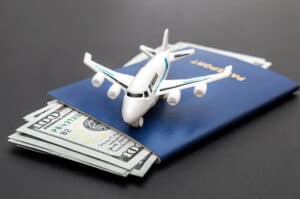 As an airline passenger, you are legally entitled to a refund for your ticket(s) and related fees whenever:
As an airline passenger, you are legally entitled to a refund for your ticket(s) and related fees whenever:
- The airline cancels your flight (for any reason), and you decide you’re not going to go on your trip because of the cancelation.
- You decide not to travel because the airline has made “significant” changes or delays to your travel plans. Keep in mind that the DOT has stopped short of defining what “significant” means here.
- If you buy an airline ticket that’s 100% refundable, you can get a refund for that ticket if you don’t end up using it to travel or if you cancel your flight.
- If your bags are lost, you’re entitled to a full refund for any baggage fees you’ve paid. Keep in mind that different airlines define “lost baggage” in unique ways, with some airline policies requiring a week or more to pass before a bag can be declared “lost.”
- The airline has downgraded your seat, like moving you from first-class to business class or economy due to overbooking or a last-minute switch in planes (for example).
- If certain “optional services” are not available for the flight, you’re entitled to a refund for any of those services that you paid for but were not able to use or access (like WiFi or a first-class upgrade). It’s crucial to understand these refunds are available when the optional services can’t be used due to flight delays or cancellations, as well as boarding denials. If the amenity is not available because something’s broken, refunds are usually left up to the airline’s policy and discretion.
- If you buy a ticket for travel plans that are at least 8 days in the future and you cancel your ticket within 24 hours of booking it (through the airline), you will be entitled to a refund.
- Poor customer service from the airline
- A bad experience on a specific flight
- Canceling flight plans for personal reasons, like illness (if you have a non-refundable ticket)
How Much Compensation You May Be Entitled to Recover
If an airline fails to honor your fly rights, you could be entitled to compensation, with amounts varying based on the circumstances involved. However, it’s crucial to point out that the DOT has specified that flight delays and cancelations (for domestic flights) are NOT, in and of themselves, grounds for compensation. Specifically, the DOT has clarified that:Contrary to popular belief, for domestic itineraries, airlines are not required to compensate passengers whose flights are delayed or canceled.
Still, air travelers may be entitled to compensation as detailed in the table below.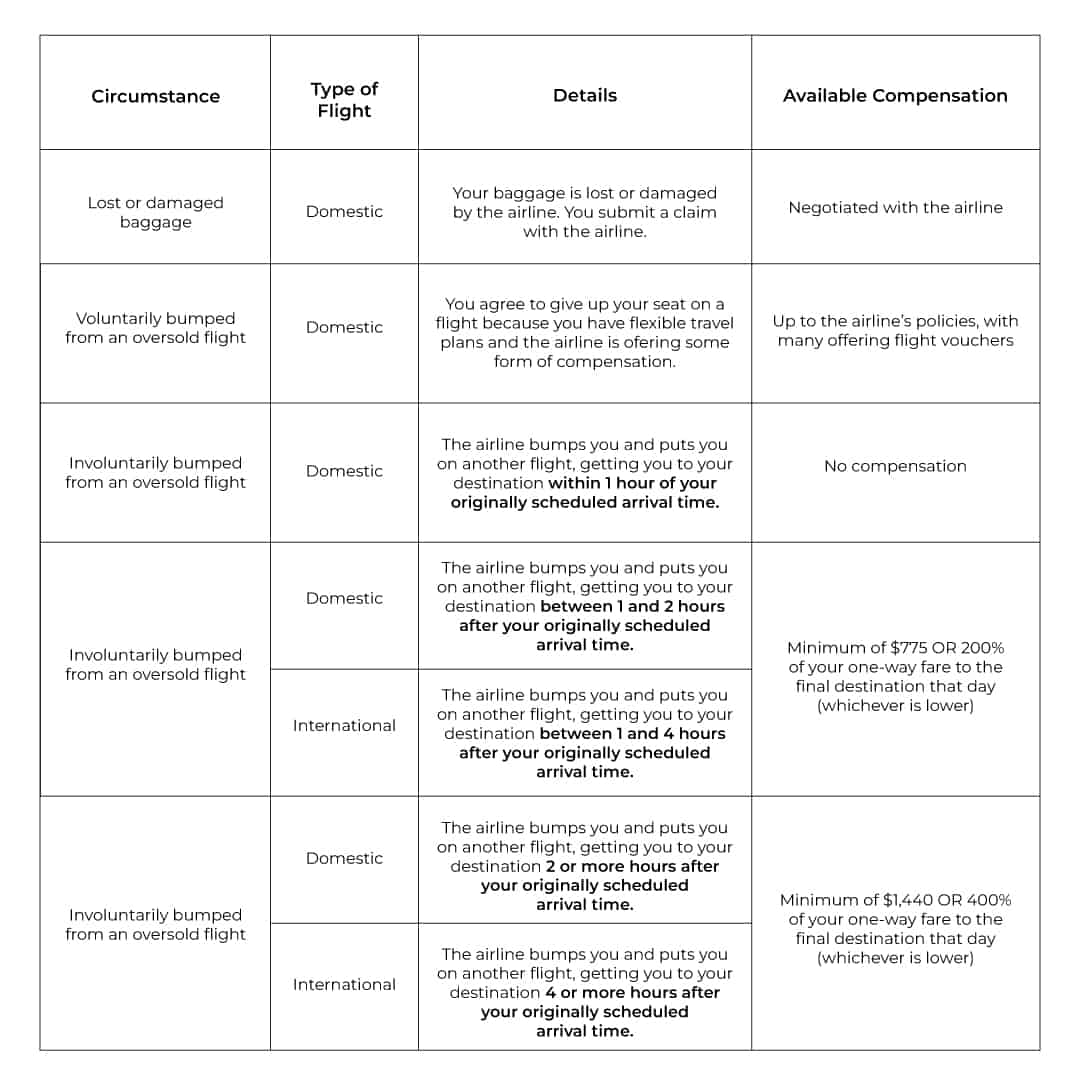 If the airline refuses to grant compensation you are entitled to — or if you feel like you are not being offered the full, fair compensation you may deserve — taking the matter to “court might be the best way for you to help yourself,” the DOT explains.
If the airline refuses to grant compensation you are entitled to — or if you feel like you are not being offered the full, fair compensation you may deserve — taking the matter to “court might be the best way for you to help yourself,” the DOT explains.
How to Assert Your Air Passenger Rights
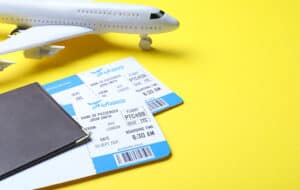 Knowing your fly rights is the first step to protecting them — and to empowering yourself to recover if you’re at a loss because an airline fails to honor your rights. Beyond that, you can:
Knowing your fly rights is the first step to protecting them — and to empowering yourself to recover if you’re at a loss because an airline fails to honor your rights. Beyond that, you can:
- Submit a written complaint or refund request to the airline.
- File a complaint with the DOT using this form.
- Explore the potential legal options for filing a claim by talking to a lawyer.
Important Resources, Forms & More for Air Travelers
Air travel can be complicated these days, but these resources can help:- The FAA’s real-time information about airport status and delays throughout the U.S. You can also sign up to get real-time updates directly from the FAA about the status of the nation’s biggest airports (via email, text, phone, and more).
- TSA’s Travel Checklist for packing, getting to the airport, and getting through security (This includes help numbers for air travelers who need to schedule special assistance to get through airports.)
- The FAA’s Preparing to Fly guide, with tips, prohibited items, weather maps, and more
- The Air Travel Service Complaint or Comment Form for complaints that are unrelated to airline safety or security issues
- Where to report airline safety issues related to flights, personnel, or facilities
- More information on how to file different air travel complaints with federal authorities, including those related to disability access issues, discrimination, and other complaints
